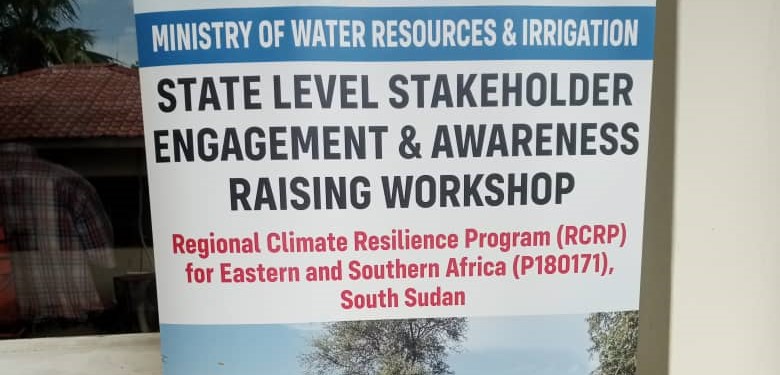A two-day State level stakeholder engagement workshop on flooding, climate change, and water management under Regional Climate Resilience Program (RCRP) South Sudan, concluded with project introduction on Wednesday in Rumbek.
Over 40 participants attended the workshop from the State Government ministries, civil society and NGOs.
The National Ministry of Water and Irrigation Director-General, Samuel David, told Radio Tamazuj that the purpose of the workshop was to make sure that the State Government takes the lead in what is to be implemented in Lakes State.
He said the entire project would be implement in five different states.
The project will be implemented under five components. Component 1 is the climate financing, while Component 2 is about infrastructure investments and sustainable assets management for climate resilience. Component 3 is the adopted climate services for resilient communities and Component 4 the project management and implementation support. Component 5 is a contingency or emergent response.
The Director-General said components 1-4 have their budget lines attached, while Component 5 is the emergency to which funds from difference components will be contributed.
He said the entire two days tried to make the State level stakeholders to understand their roles and what the project hopes to achieve.
“In every implementation there must be some key documents including the environmental impact assessment and the policies that the World Bank does not want us to contravene,” he said.
Stephen Mathiang Deng stressed the need for proper management of water resources, noting that once people have enough water, they will have some reserves for their animals in the dry seasons.
A chairperson of a State Project Coordinator Committee in Lakes State, Mager Anyuon Thuc, said they were happy to start the five-year project.
“We are planning to dig some water reservoirs, with this program. We are also urging our partners to consider the existing water boreholes, so that they can be upgraded,” he said.
Lutana Musa Lasu from the Ministry of Environment and Forestry said the climate resilient project is funded by World Bank and South Sudan is part of it alongside Mozambique, Comoros, and Botswana.




